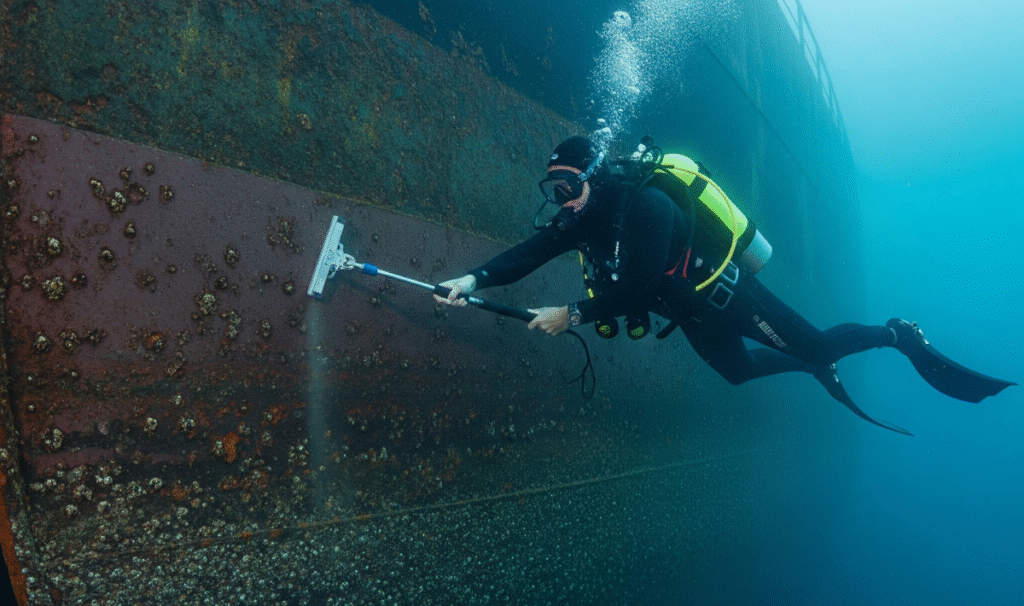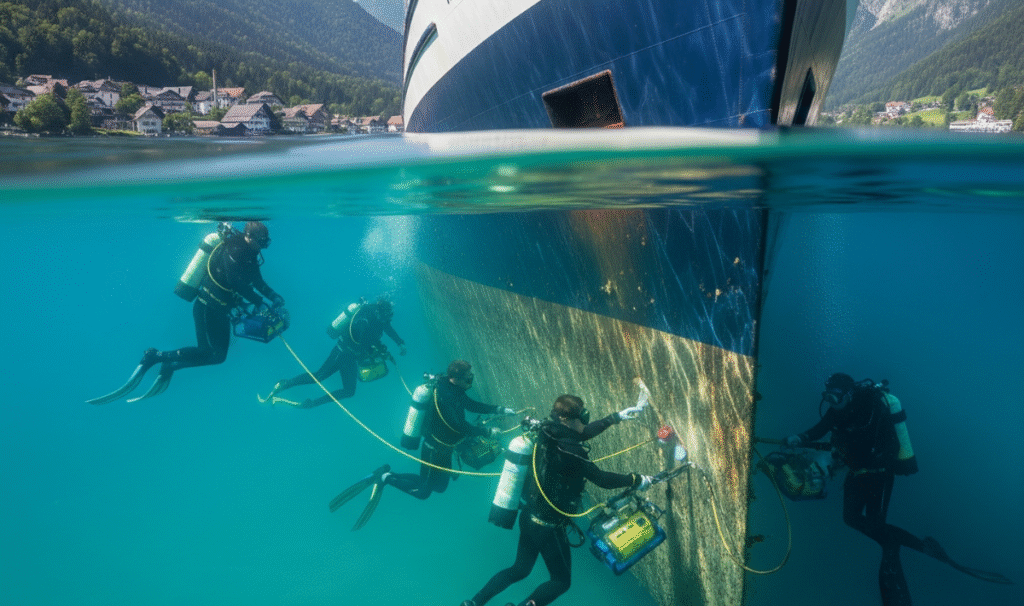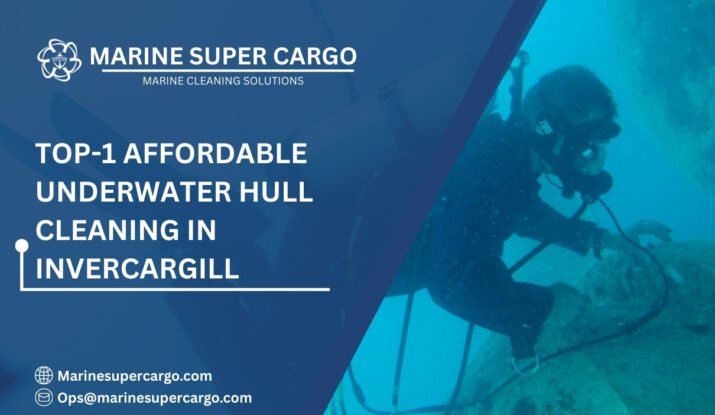Have you ever wondered why underwater hull cleaning in Invercargill is a top concern for anyone piloting a boat, yacht, or tanker in New Zealand’s far south? Picture your vessel as a marathon runner: the hull is its shoes. Clean, streamlined, and free of extra weight, every stride feels effortless. But caked in mud and marine hitchhikers, even the finest hull feels heavy, slow, and costly to drive. Down in Invercargill, where the southern seas brim with life, regular hull cleaning is both your best defense and your vessel’s secret weapon—for speed, savings, and staying within the law.
Why Underwater Hull Cleaning in Invercargill is Essential for Vessels
Let’s get real: the longer your boat stays in these waters, the thicker the layer of marine life clinging to its hull. Barnacles, seaweed, slime, and other “guests” will make themselves right at home. This build-up is known as biofouling, and even a little leads to big headaches: more drag, sluggish response, and burned fuel. Worse, unchecked growth can pit and corrode your hull’s protective coatings, slamming your wallet with repair bills or even putting you in regulatory hot water.
The Southern Marine Environment—Biofouling in Invercargill Waters
Invercargill sits near New Zealand’s southern tip, hemmed by chilly currents, strong tides, and nutrient-rich marine flows. These attract a stunning variety of marine life—and unfortunately, most of it wants to stick to your hull. Cooler waters don’t mean less fouling; in fact, Invercargill’s blend of salinity, seafood, and seasonal warmth means steady, stubborn build-up all year long. Vessel owners here can’t afford to be complacent—proactive cleaning is non-negotiable.

Risks and Consequences of Neglecting Underwater Hull Cleaning in Invercargill
Skipping regular hull maintenance invites trouble:
- Slower speed and poor maneuverability
- Higher fuel costs and engine wear
- Faster coating, anode, and paint failure
- Risk of port delays, fines, or denied access under NZ biosecurity laws
- Spread of invasive species, triggering penalties [IAPH]
How is Performed Underwater Hull Cleaning in Invercargill
Professional underwater hull cleaning in Invercargill blends careful planning, robust safety, and highly specialized tech for a safe, thorough clean.
Dive Preparation and Safety Best Practices
Before divers ever enter the water, teams assess weather, tides, water clarity, and the vessel’s location. Pre-dive checklists, communication systems, and continuous lookouts ensure everyone stays safe in Invercargill’s sometimes unpredictable southern seas.
The Latest Tools, Technologies, and Cleaning Techniques
Modern pros employ a toolkit customized to both vessel size and fouling type:
- Rotary brushes or “brushkarts” for heavy barnacle and weed removal
- Water-jet systems tuned for fragile coatings
- ROVs (Remotely Operated Vehicles) for zero-risk checks and delicate areas
- Hydraulic suction and debris capture systems to prevent marine pollution—a critical step for regulatory compliance
- Comprehensive photo and video inspection to document success and spot trouble early
Every cleaning is carefully managed for efficiency, environmental safety, and hull protection.
How to Choose a Trusted Service of Underwater Hull Cleaning in Invercargill
You have options, but not all providers are created equal.
Experience, Certifications, and Regulatory Compliance
Deciding How Often to Clean Your Hull
In Invercargill’s productive marine environment, most vessels need cleaning every 2–4 months. For commercial ships and vessels stationary for extended periods, more frequent cleaning—often quarterly or by MPI standards before or after international voyages—keeps you in the clear with regulators and insurers.
Environmental Rules and Responsible Biofouling Management Underwater Hull Cleaning in Invercargill
New Zealand enforces strict marine regulations, and all underwater hull cleaning in Invercargill must:
- Meet MPI’s Craft Risk Management Standard (CRMS)
- Prevent marine pest spread with in-water debris containment and filtration
- Use eco-safe, non-toxic methods aligned with IMO environmental guidelines
- Follow local restrictions on cleaning zones to protect sensitive habitats
- Maintain proper documentation and marine pest checks to avoid fines or detentions
Understanding the Costs of Underwater Hull Cleaning in Invercargill
Pricing depends on size, fouling severity, and accessibility, but expect the following:
- NZD 6–12 per foot for most vessels, with higher rates for large ships or extra services such as propeller polishing or niche area cleans
- Fees for “rush” cleaning, after-hours work, or advanced tech (ROVs, detailed video reports)
- Regular cleaning = long-term savings: lower fuel bills, fewer emergency repairs, and reduced need for extensive dry-dockings
DIY Versus Professional Underwater Hull Cleaning in Invercargill—What’s Best?
While a motivated owner might consider a DIY scrub, it comes with serious risks:
- Safety hazards: Cold waters, tidal currents, and nearby commercial vessels can be dangerous.
- Compliance issues: DIY efforts often lack proper debris filtration and rarely meet MPI or MARPOL Convention standards—leading to possible fines.
- Risk of damage: Improper tools or techniques can harm coatings, anodes, or void warranties.
- Missed warning signs: Pros can detect early-stage fouling, corrosion, or invasive species before costly damage occurs.
Certified professionals bring the tools, training, and documentation required for effective, legal, and environmentally responsible hull cleaning.
The Benefits: Fuel Efficiency, Longevity, and More
Why invest in professional underwater hull cleaning in Invercargill?
- Save up to 15% on fuel by slashing drag
- Avoid unscheduled downtime during inspections or port calls
- Extend the lifespan of expensive coatings and hull fittings
- Meet MPI and insurance requirements—avoiding fines, refusals, or lost contracts
- Enjoy safer, easier handling and a fast return to the open ocean

On the Waterfront: Local Stories and Insights
Veteran skippers in Invercargill have learned the value of clean hulls the hard way. A local fishing crew credits quarterly cleaning for keeping their vessel competitive and fuel costs down, while a charter operator avoided a costly dry-dock after divers spotted a corrosion “hot spot” during a routine underwater inspection. Community support for sustainable, eco-friendly hull cleaning is strong, helping keep local seas healthy for everyone.
Conclusion: Set Sail with a Clean Hull in Invercargill
Underwater hull cleaning in Invercargill is far more than a routine—it’s your ace on the water and your promise to the future. By choosing expert, certified divers and sticking to a regular schedule, you unlock better performance, regulatory peace of mind, and real-world savings. In these rich, beautiful southern waters, every clean hull preserves not just your boat, but the coast we all cherish. Here’s to confident, clean, and speedy voyages from Invercargill!
FAQ:
Q1. How often should I schedule underwater hull cleaning in Invercargill?
Every 2–4 months is standard, but adjust for your vessel’s use, antifouling, and fouling rates.
Q2. Are there strict environmental rules for hull cleaning in Invercargill?
Yes—cleaning must meet MPI biofouling standards, include debris containment, and avoid sensitive marine areas.
Q3. What is the typical cost for hull cleaning in Invercargill?
Expect NZD 6–12 per foot, with higher rates for complex jobs, extra video documentation, or emergency services.
Q4. Can I clean my boat’s hull myself?
DIY cleaning is not recommended due to safety, environmental compliance, and insurance requirements—hire certified professionals for best results.
Q5. How does underwater hull cleaning improve performance and savings?
Regular cleaning cuts drag, saving up to 15% on fuel, keeps your vessel nimble, and helps spot issues before they turn costly.


